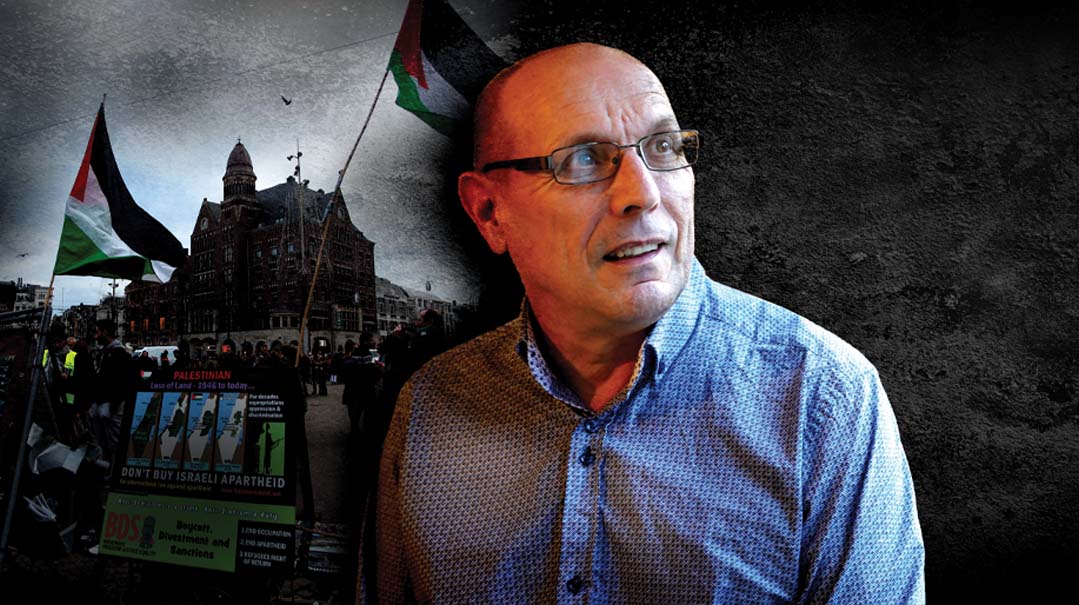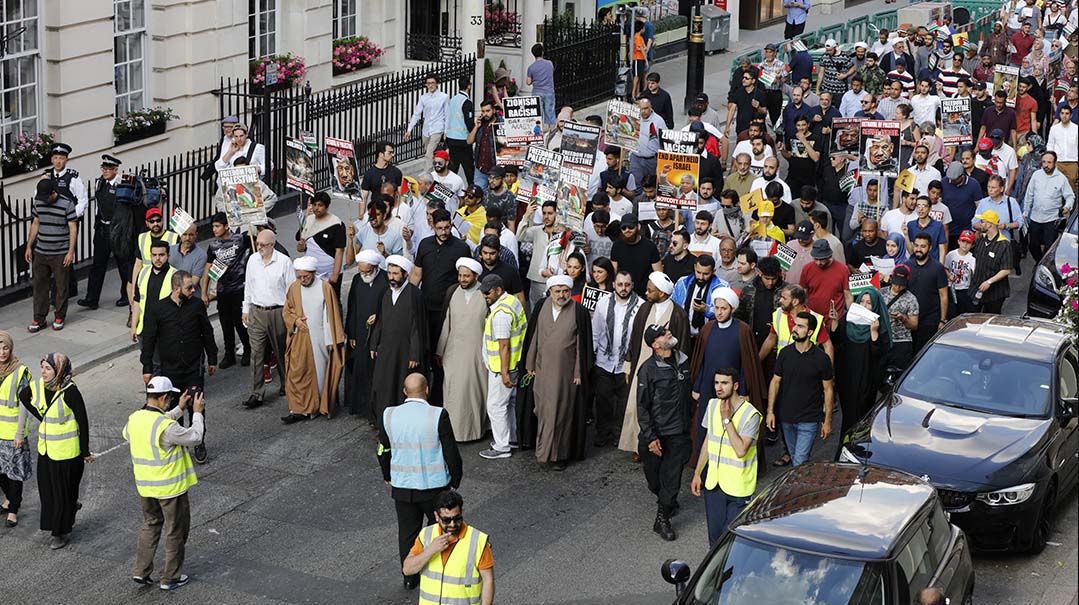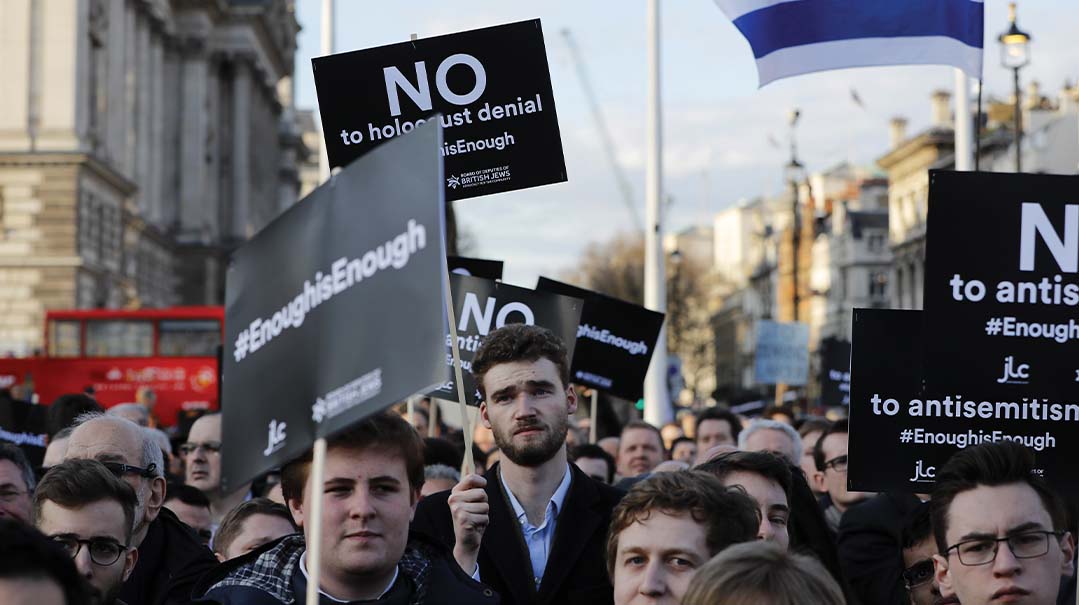Keyboard Warrior

How an undercover activist exposed London's Jew-hating elites

Photos: Mendel Photography
It was a remote place to pick for a high-level strategy meeting. In late 2016, a group of activists made their way to a building on an industrial estate in west London, climbed a staircase to the second floor, and seated themselves around a few tables.
The group was a Who’s Who of the anti-Israel movement in the BDS capital of the world. Just a few months before the centenary of the Balfour Declaration — and mere miles from where British foreign secretary Arthur Balfour had written his historic letter of support for Zionism — the activists were planning to mark the occasion with a new offensive against Israel.
All except one of the assembled. Despite his kaffiyeh, BDS badges, and regular appearances on London’s pro-Palestinian scenes, “John” Collier was not all he seemed.
That’s because his real name was David, he was actually a pro-Israel investigative blogger, and he was wired up with recording devices to share details of the meeting with the world.
“I sat next to one of the key figures in the movement talking about strategy,” recalls David Collier from the comfort of his North London home, “and suddenly it occurred to me that here I was in the belly of the beast, and that if they found out, I would be in real trouble.”
Six years later, with Amnesty International — a UK heavyweight in the anti-Israel world — releasing a report accusing Israel of apartheid, Collier connects the dots between that meeting and London’s status as BDS capital of the world.
The gathering at the industrial estate was just one of a steady stream of stories about the anti-Israel scene that Collier reported. His painstakingly researched investigations lit the fuse on the scandal of Corbynite anti-Semitism that blew up in 2018, contributing to the Labour Party leader’s downfall the following year.
But as the Amnesty report shows, Britain’s anti-Israel scene is as viciously effervescent as ever. Coming just three years after Jeremy Corbyn’s close brush with power, it raises the question of why one of the most historically tolerant of countries has become a central hub of bigotry.
From close encounters with the mix of hard-left and Islamist activists who drive the BDS campaigns, Collier has the answer: It’s a “Red-Green” coalition, or Britain’s history of socialism colliding with failed policies on representation of Muslim communities.
David Collier has an academic background, but he’s also a fighter. Now too well-known to his foes to report from the trenches, his blog and social media accounts are the conduit for a torrent of lacerating reportage and commentary trawled from the cesspools of the anti-Israel ecosystem. His language is combative — “the enemy,” he calls his foes, “hateful anti-Semites.”
But even as this lone ranger continues his keyboard war, contributing to tactical victories such as the fall of the Corbynistas, he’s alarmed by the creeping success of the Britain-born anti-Israel movement. It’s now urgent, he says, to fight back using different tactics.
“Amnesty’s report comes from a system so dark and filled with hate that it’s more suited to the 15th than to the 21st century. You can’t fight it by getting caught in their individual allegations, but by exposing how they want to destroy Israel.”

At the Hezbollah-linked Al Quds Day Parade 2017 (top), police stood by as speakers spewed hate
Carnage Up Close
Infiltrating the BDS world is not how a young David Collier would have predicted his future career, but a relentless nature, combined with witnessing both sides of the Israeli-Palestinian conflict up close, decided his path.
“I sat on the Tel Aviv beachfront and heard the explosion that hit the Dolphinarium disco in June 2001,” he recalls, “and was walking towards Allenby Street as Café Bialik was bombed in March 2002.”
Born in 1960s London to an unaffiliated Jewish family, Collier followed a then-conventional route from school to university, and then, in 1987, headed to Israel to spend time working on a kibbutz.
That “gap year” stretched to almost two decades in the country. But kibbutz life quickly gave way to the lure of capitalism as the new arrival — with only a shaky grasp of Hebrew — started his own business providing tourism-related services to both Israelis and Palestinians, as well as to NGOs operating in the country.
“Up until the start of the Second Intifada, I was as likely to be in Jericho or Ramallah as in Tel Aviv or Haifa,” he says. “In September 2000, I was there on the ground, in Ramallah, Bethlehem, Jericho, and Nablus, as the peace process collapsed in violence.”
An early precursor of Collier’s keyboard warfare came via his business activities. “It was before the Facebook era, and I was good online, so I would go on chat rooms where people were trying to find out about visiting Israel. I’d talk about the country and then plug my business.
“But then came the Second Intifada, and there were thousands of accounts talking about the conflict. I was pushing nonsense at first, but I have an inquisitive mind and researched what the Israel-haters said, and bit by bit started to understand their mindset.”
The unraveling of the Oslo Accords in 2001 was a grim time to be in Israel, as suicide bombings rocked the country and the tourist-driven economy cratered. Collier’s views on Israel’s struggle were shaped by close encounters with Palestinian terror, such as the bombings he witnessed in Tel Aviv. But those views became part of a larger tapestry when he began tracing threads that led to the land of his birth.
Having long settled into Israeli life, the reality that Britain was emerging as part of the international terror scene struck home in 2003. Collier had finished talking to a friend who worked in Mike’s Place, a Tel Aviv bar. Hours later, two British Muslims blew themselves up in the tourist spot, and the friend died along with two other Israelis.
“Those suicide bombers weren’t oppressed Palestinians from Gaza or Jenin, but British lads from London and Derby.”
Despite feeling more Israeli than British, by 2006 — after almost two decades in the country — Collier decided to return to London.

DAYENU The 2018 protest again Corbynite anti-Semitism was triggered, in part, by a Collier report
Difficult Homecoming
The Britain he returned to felt very different from the one he’d left in the mid-’80s when he came to Israel.
In the wake of the anti-Israel hate fest at the UN Durban Conference in 2001, Marxist academics in Britain tried to launch an Israel boycott. That effort sputtered, but it birthed what is now the global BDS movement.
It was in that atmosphere of left-wing Israel demagoguery, centered on college campuses, that David Collier returned to university to study management and ethics.
As a mature student, Birkbeck College — part of the University of London that caters to his demographic — was the natural place to go. Birkbeck shares a campus with SOAS (the School of Oriental and African Studies), a hotbed of Palestinian activism dubbed the “School of Anti-Semitism,” and Collier was quickly drawn into the fray.
“In the Gaza wars of 2009 and 2012, I saw hostile anti-Israel demonstrations and was told by pro-Palestinians that they wanted to nuke Israel.”
Still shocked by the ferocity with which left-wing sentiment had turned on Israel, the British Jewish community was mounting its own defense, including counter-demonstrations. David Collier didn’t play a part in these — in fact, he was going his own way.
“I wasn’t part of the UK Jewish establishment,” he admits. “I feel Israeli. I’d been away for 20 years, and nobody in the Jewish community knew me. I wasn’t part of a shul or community, so I did my own thing.”

“John” Collier (above) in his BDS gear
Undercover Moves
Collier’s next steps didn’t quite qualify him for the Mossad, but marked him as an unconventional asset to the pro-Israel community.
Taking advantage of an Anglicized surname bequeathed by an ancestor arriving on Britain’s shores, he set himself up in the online and street-level pro-Palestinian worlds as “John Collier,” a kaffiyeh- and BDS-badge-wearing member of the anti-Israel universe.
For the next four years, he showed up at university campuses, anti-Israel marches, and pro-Palestinian strategy sessions, and began feeding reports of the anti-Semitism to journalists, as well as recording the accounts on his own blog.
The tone of his reports was raw, inelegant — nothing like the output of the mainstream advocacy organizations — but all the more powerful for it.
“The twisted, lying academics at the University of Warwick,” reads one report. Taking aim at a bête noire — anti-Israel Jews — Collier titled another broadside: “Avi Shlaim, the foolish old man and the adoring churchgoers.”
But delivery apart, Collier’s “direct action” methods exposed what anti-Israel bigotry looked like on the ground.
“It is 3pm on June 18th 2017,” Collier writes in one blog post. “I am in disguise, wearing a keffiyeh that is necessary to cover my face. I want to infiltrate the Al Quds Day march and the only way I can participate is to remain unrecognized. I stand next to the terrorist flag of Hezbollah. The stewards are on the lookout for people like me, and although I am quickly questioned, their suspicions do not allow them to remove the kaffiyeh. They could not know who was behind the mask. I stare them down. I remain unidentified and I am in.”
Once inside, the blogger was able to report the ugly reality that mainstream media outlets chose to ignore: that on the streets of London, police stood by as anti-Semitic hate blasted the crowd.
“Nazim Ali on the megaphone spewed out hate,” Collier reported. “All manner of antisemitic conspiracy was shouted out through the speakers. The BBC are silenced through the power of Zionists, Israel is ISIS. By a country mile the most despicable attack was linking the ‘Zionists’ (read Jews) to the recent tragedy in Grenfell [a 2017 London high-rise fire that killed 72]. An entire tower block reduced to ashes, and clearly the fault of the Jews. The police did nothing. When asked about some of the hate being spewed: ‘It’s an opinion,’ one said.”
Jewish Money
It was the height of the 2015 “Knife Intifada,” and once again Jewish blood ran in Israel’s streets.
Palestinians high on incitement attempted to stab and hack wherever a Yahud walked unaware; supermarkets pulled kitchen scissors from aisles to reduce the supply of ammunition; and, not for the first time, Machaneh Yehudah went from shopping destination to terror target.
Two thousand miles away, near the historic walls of London’s Parliament, an echo of that hatred was heard.
At a meeting of the Palestine Return Centre (PRC), the host — Gerald Kaufman, a notorious anti-Israel MP from the Labour Party who had previously compared the IDF to Nazis — gave his version of events. Israeli soldiers, he said, were shooting innocent Palestinians, and then planting knives near the victims as a pretext for the killings.
“And you know why they can do this?” the MP ended his hate-filled tirade. “Because Jewish money buys the silence of our government.”
Sitting in the audience for that display of bigotry was the man who reported Kaufman’s words to the media.
“The horror always sticks in my mind,” says Collier. “Here, in the home of British democracy, was a politician talking about the power of Jewish money and promoting a blood libel.”
Slick Hatred
Constant exposure to London’s large anti-Israel world taught David Collier that the BDS movement is a mixture of sophisticated organizers preying on the naïveté of people wanting to do some good on the cause du jour.
“A typical campus event has a standard format,” he says. “An academic gets up and tells the audience how awful Israel is, often using a well-produced video. The next person is a Palestinian from somewhere in Judea or Samaria speaking about how hard life is under ‘occupation.’ The third speaker is from the BDS movement, whose pitch is, ‘You’ve heard the problem — here’s what to do about it.’ ”
But slick organization apart, the ridiculous level of the accusations that Israel faces quickly became apparent.
“At one conference in Exeter University, a British-born academic got up and told the audience that she was a Palestinian refugee. After the talk, I went over and asked where her parents had been born. ‘In England,’ she replied. The same turned out to be true of one set of grandparents.
“ ‘So, you live in Britain, your family is British, and you want to go to a foreign country and change it, when you’re an alien invader. How are you not a mirror of the Zionists?’ I asked her.”
The movement’s hypocrisy was not the only thing that Collier witnessed. He also saw the far left’s warped attitude to Jewish identity.
“You can’t have a conversation with an anti-Israel activist, because coming from a mostly Christian mindset, in the case of the far left, they see Jewishness as a religion, not a nationality. They can’t get their heads around the idea of a secular Jew, so they deal with us as they deal with Christianity. They see us as white Europeans who happen to be Jewish by religion, who then invade someone else’s country, based on something written 3,000 years ago.”
The basic lesson that Collier drew — putting him at odds with others in the pro-Israel field — was the realization that it was pointless to engage with the anti-Zionist movement.
“We have to focus on the 60 percent of the population who are not on their side — we shouldn’t waste our time trying to convince those who hate us.”
Despite the large number of hours spent under his assumed identity, Collier found that the pervasive anti-Semitism prevented him forming any friendships.
“It’s not that they’re talking about Jews,” he clarifies. “They think of themselves as anti-racists and talk about Zionists. In one of the Facebook groups that I was on, someone posted something about ‘Jew-Nazis,’ and someone replied, ‘You can’t say that — you have to say ‘Zio-Nazis.’
“But their movement makes sense to them only by buying into anti-Semitic ideology. The only way you can see a tiny nation — which has spent its entire existence beleaguered, attacked, and demonized — as a powerful evil that must be destroyed is if you believe in Jewish power.”
A glimpse into the mindset of the other side came to the undercover Israel activist through his online immersion in the pro-Palestinian world.
“My Facebook profile as John Collier was like a bubble in which I was surrounded by anti-Zionists,” he recounts. “Inside this group, they’d be constantly posting edited clips from Arabs or biased journalists. It was a stream of fake news, like, ‘18 people were just murdered by Israel,’ using doctored or old footage.
“So if the only people in your world are activists — who see the BBC or the Guardian as Zionist — then you’re swimming in a sewer.
“When you turn off social media and turn on the TV and see nothing about Israel, you think to yourself, ‘How can it be that all these Palestinian kids are massacred daily by the brutal Israeli army and the BBC isn’t talking about it?! It must be because Zionist power is silencing them.’ ”
Exposing Corbyn
Like a secret agent whose cover has been blown, by 2017 David Collier’s insider status on the anti-Israel scene had become impossible to sustain.
“They were starting to figure out who was breaking these stories,” he says.
By then, his knowledge of the BDS world’s engine room enabled him to blow the top on the biggest scandal yet — Jeremy Corbyn’s intimate links with those who’d demonstrably crossed the line from anti-Israel to anti-Semitic.
Corbyn’s election in 2015 shocked the Jewish community, as well as much of the country, who remembered the Labour Party leader’s history of embracing terrorists from the IRA to Hamas.
But when Conservative prime minister Theresa May’s 2017 decision to call a snap election backfired, leaving her with a tenuous majority, the far-left leader looked to be only a whisker away from power.
Then, in early 2018, a stream of revelations about Corbyn’s associations with anti-Semitic characters began to hit the press. One was a story about Palestine Live, a secret Facebook group with 3,000 members, including leaders of the range of anti-Israel movements. Behind the leaks, as author of an exhaustive 200-page report about the page, was David Collier.
The Facebook group, the pro-Israel investigator reported, contained posts of deeply anti-Semitic material, such as those approving of the Protocols of the Elders of Zion, or others linking Orthodox Jews to Holocaust denial. One of dozens of screenshots showed Agudah MK Yisrael Eichler with the headline “A Rabbinic Call for Genocide,” and a comment from the group admin, saying “horrendous suggestion.” Another was a ditty with the lines “The Jewish lobby, it’s plain to see / is full of people unlike me.”
The report included a screenshot from the group’s admin that typified the toxic material that had flowed by an indifferent Corbyn. “We don’t usually do all the holocaust questioning stuff in here…there are other places for that…but not here…is that ok?”
“Nobody should be able to spend any time at all in that group,” wrote Collier about Corbyn’s membership of the Facebook group, “without understanding the twisted antisemitism that drives so much of the activity.”
The story exploded in the media, setting off a chain reaction that saw journalists digging through Corbyn’s social media history. It wasn’t long before Corbyn’s approval of an anti-Semitic mural came under scrutiny.
A month later, on Erev Pesach 2018, hundreds of people — led by community organizations such as the Board of Deputies — demonstrated outside Parliament against anti-Semitism in the Labour Party.
The anti-Semitism scandal so relentlessly documented by Collier had played a prominent role in the Corbyn project’s downfall.
“The scary thing,” Collier says, “is that if it wasn’t for Labour’s opposition to Brexit and Corbyn’s historic ties to the IRA — which large parts of the right-wing press hated — then his anti-Semitism wouldn’t have become such an issue. It’s chilling, but it’s the truth.”
Red-Green Alliance
Fast-forward three years, and the Corbyn saga explains why Britain continues to punch above its weight in the BDS arena, as typified by the Amnesty report released last month accusing Israel of apartheid.
“Britain is different from America in a few ways. Firstly, socialism and even communism have always been powerful forces on the left here. Historically, the left has been on the fringes of politics, and Labour has only been able to get into power when the Conservatives implode, or when it moves to the center, as in the Blair years, when the party was ‘Conservative-lite.’
So, the hard left is left to rage in the wilderness unless they can gain critical mass by alliances. That’s the source of the “Red-Green” coalition, bringing together the traditional hard left and Islamists.
Such alliances are born naturally at the local level. When the far left and Islamists from the Bangladeshi, Pakistani, or Somali communities sit around the table at local council meetings, Collier explains, the one cause that they all agree on is Israel, or possibly Indian-occupied Kashmir.
“That’s why, in areas where the left dominates, such as academia, the unions, and NGOs, that alliance is the driving force.”
Amnesty UK is the Red-Green alliance personified. Collier’s extensive research on the organization — two years and 200 pages long — traced the radical views of the NGO’s staff, and their impact on Amnesty’s focus.
“An organization is the sum of its parts,” he says. “Who decides which countries to focus on? The employees. For example, an activist from Code Pink — an American organization that supports Iranian weapons development — was employed by Amnesty.
“The social media account of another activist shows that he celebrates Pakistani Independence Day. There’s nothing wrong with that, but Amnesty would never employ a flag-waving Israel supporter.
“And you see the results on Amnesty’s Twitter account. Over the last two years, there have been dozens of tweets about Israel, and none in defense of Christians in the Middle East, and only two about Pakistan. So, there’s an Islamist-lite pass to Pakistan, and an obsession about Israel.”
Tides of History
In the few days since our conversation, David Collier’s blog and Twitter account have moved on, continuing the offensive against the powerful NGO. Digging into his own undercover past, he uses his own experience as a metaphor for the NGO’s tactics.
“The anti-Israel activist Ben White is one of the stars of anti-Israel activism and deliberately demonizes Israel everywhere he goes,” writes Collier. “I mention him because of his manner of delivery.
“I have watched and spoken to Ben White on numerous occasions. Once, even though he probably does not remember it, I sat down next to him at a roundtable event to discuss BDS strategy. What White does when he opens his talks is throw ‘facts’ and ‘statistics’ at people in a barrage. Because most of those in audience are already sold on whatever it is Ben White is selling — they just sit in admiration of his ‘knowledge’ and accept whatever conclusion he provides for them. It’s a great tactic.
“Amnesty International just did exactly that in a 200-plus page report containing over 200,000 words. They simply misdirected everyone under a mountain of nonsense.”
But the giant aggregation of bigotry and lies that is the rabidly anti-Israel ecosystem ploughs on, seemingly impervious to a few negative media headlines or accusations of anti-Semitism. Are the Amnestys of the world winning?
“Israel and the Jewish People are caught up in a wider battle for the future of the Western world,” Collier says, “in which the rise of identity politics has pitted British society against an alliance of hard-left, progressive, and Islamist groups. If they exert greater control over the country — for example, by putting a critical mass of Corbynite MPs in Parliament — then BDS wins.”
That combination of hard-headed realism and history is why, after years of fighting Israel’s detractors, David Collier finds himself pessimistic about the future.
His references to the Jewish People as “tiny and demonized” convey a grasp of the inner workings of his people’s history, even if the language of faith isn’t part of his lexicon.
But whatever the end result, he’s not giving up the fight. “When someone demonizes your family, you want to open your mouth.”
(Originally featured in Mishpacha, Issue 900)
Oops! We could not locate your form.






